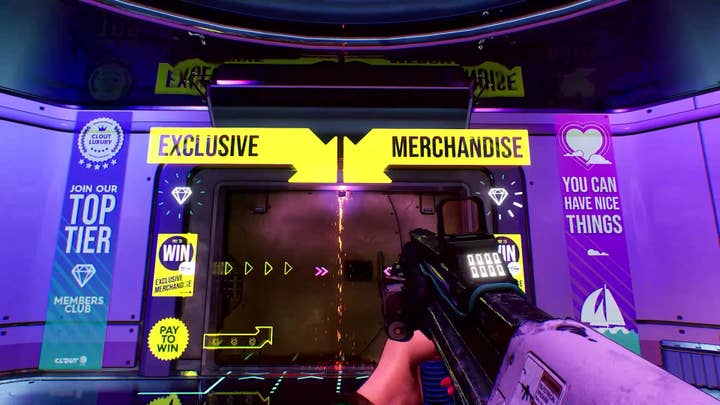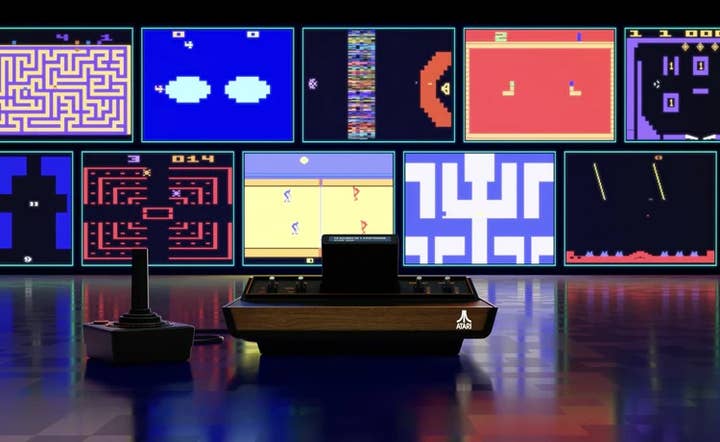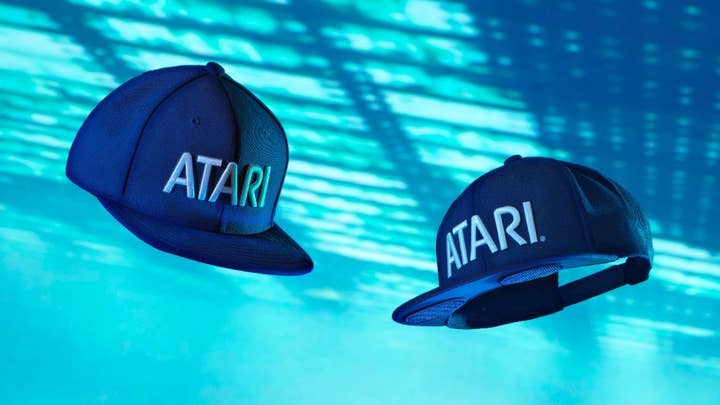Speakerhats off to Atari | This Week in Business
Too many big companies cutting staff this year should have followed the example of the most debased brand in gaming
This Week in Business is our weekly recap column, a collection of stats and quotes from recent stories presented with a dash of opinion (sometimes more than a dash) and intended to shed light on various trends. Check every Friday for a new entry.
Every layoff tells its own story, but with so many layoffs this year, there's one version of the story that is getting beaten into the ground.
This week we saw a few clear examples of it; see if you can spot the common thread.
QUOTE | "We regularly review our businesses and make adjustments to centre on long-term strategic growth areas. Following a recent review, we've made the difficult decision to restructure our gaming business." – A representative with ByteDance explains why the TikTok owner is getting out of games entirely in a restructuring likely to result in hundreds of layoffs.
QUOTE | "Frontier's move to diversify its game portfolio during the last five years, including through third-party publishing and new games in 'adjacent genres', has not delivered the anticipated success. As a result, the Company has refocussed on [creative management simulation] games which have delivered stronger and more predictable returns through Frontier's expertise and leadership in that genre." – Frontier Developments explains why it's focusing on the genre that gave it hits like Planet Coaster, Jurassic World Evolution and Planet Zoo. Naturally, it announced layoff plans last month and also confirmed the demise of Foundry, the publishing label it established during the pandemic.
QUOTE | "Each studio has its own strengths and weaknesses, but the favorable winds of the early Covid-19 period, coupled with the strong performance of each title, led us to adopt a strategy of accelerating more, even in areas where those studios have not tried yet for further growth. However, some studios did well and some did not, so we have decided to focus again on the strength of each studio." – In a presentation to investors, Sega Sammy CEO Haruki Satomi explains why Creative Assembly's sci-fi shooter Hyenas was canned, people were laid off, and the studio is going back to focusing on the real-time strategy games for which it's best known.

QUOTE | "While no additions have been finalized, it's clear that we will reduce the number of things we are doing overall." – Unity interim CEO Jim Whitehurst explains that the engine maker is going to reverse course on some of its moves into non-core businesses in recent years. The company added 265 employees to its 2023 layoff total this week as part of that plan.
That's all from this week, and you don't have to look far in 2023 to find other companies using similar excuses for layoffs.
Digital Extremes laid off people as it closed the indie publishing division it launched last year.
Lifestyle and esports brand 100 Thieves laid off 20% of its staff and spun off its energy drink and game development businesses.
QUOTE | "We're making these changes because we believe it's time for 100 Thieves to refocus on our core business and do less, better. As the economic landscape has changed in the past two years, the growth of our business did not keep pace with the growth of our organisation. We cannot afford as large of an organisation as before and that responsibility falls on me and [CEO] Matt [Haag]." – 100 Thieves president and COO John Robinson explains the cuts. He did not explain why the people responsible are keeping their jobs while so many people who weren't responsible are losing theirs. (Haag is an owner and the founder of the company, so we can guess on that one at least.)
Amazon Games also realized it has a hard enough time with making games and that it probably didn't also need to be running a Twitch channel styled after a TV network running game shows and other general entertainment programming.
QUOTE | "We are proud of the work the teams have been doing, pushing into new areas with weekly content on Crown Channel, and finding more ways to help publishers reach new audiences with Game Growth. But after further evaluation of our businesses, it became clear that we need focus our resources and efforts to deliver great games to players now and in the future." – Amazon Games VP Christoph Hartmann explains to employees why the company laid off about 180 people, the second round of Amazon Games cuts this year.
And all of the above is just the carnage from November.
It's not hard to look back at the rest of the year and see this theme reflected in other cuts, like how Epic's layoffs were the result of absurd over-investment in expanding the business to chase the metaverse. Meta's layoffs conveniently fit under the same umbrella. And then there's Embracer Group, whose litany of layoffs and shutdowns this year can be attributed to the company losing focus on actual game development and recklessly pursuing its ambition to become the gaming equivalent of Tetsuo from the end of Akira.
And while it thankfully hasn't involved layoffs, the live events company I work for announced this week it is looking to sell GamesIndustry.biz and the other games journalism sites it bought several years back, sites that could be fairly characterized as not a core part of a live events business.
Regardless, one thing we've seen a lot of over the industry's pandemic boom is companies using their resources to expand into other businesses, some of which they had no business entering in the first place.
Now I know businesses have to grow, and it's tempting to start taking big swings when times are good and it feels like you've got a cushion to work with. Sometimes it even works out great for the company involved. I may criticize Amazon Games for trying to run a TV network on Twitch, but in the grand scheme of things, that online book store has done pretty well branching out into new businesses.
Be that as it may, I think there's a better, smarter, less risky way to invest in growing a business, which is a transition I am shocked to be using to talk about this next company.
Atari is doing it right
My Signs of the Apocalypse bingo card is just about full, but I'm marking off a truly unexpected square as I'm going to spend some time saying nice things about Atari.
Yes, Atari.
Before we start speaking well of the undead, I have to acknowledge my personal track record of taking some pretty untenable positions on this site. Like that time I argued that EA had a stronger lineup of Wii games than Nintendo itself, or when I suggested Call of Duty had finally peaked (and then Modern Warfare 2 came out and broke all the records), or the time I tried to stick up for Bobby Kotick. I reserve the right to be hilariously wrong about everything I'm about to say.
But I just interviewed Atari CEO Wade Rosen and came away feeling more optimistic about the company's stewardship than at any time in the past 30 years. Granted, that's a pretty low bar to clear, but I think the company has blown right past "less bad" decisions and may already be in "good, actually" territory.
Even so, after decades covering the various incarnations wearing the corporate skin suit of Atari, I can't just jump to the good stuff that the current management team is doing. I have to set the stage by detailing the state of the company the previous management team left it in.

Atari did it all wrong
Depending on how you feel about the Infogrames era, Atari has floundered for decades and has only survived to this point because the brand itself was so instrumental in building the early games industry there would always be someone ready to dust it off and at least make a business out of slapping it on a T-shirt (and someone else willing to buy that shirt).
While there's nothing particularly wrong with a business that lives off licensing, management always had loftier goals for the brand.
QUOTE | "I didn't buy the company to make T-shirts and stuff like that. We are way, way, way beyond that." – Atari CEO Frederic Chesnais in 2014, shortly after taking the company out of bankruptcy.
How far beyond T-shirts, exactly? Hats. And not just hats, but hats with speakers in them.
OK, credit where it's due, Chesnais really did follow through on his plans to take the company beyond T-shirts, even if we kind of wish he hadn't.
Under Chesnais, Atari got mixed up in all kinds of deeply unsavory businesses, including gambling, blockchain, and Denny's.
There were also more understandable moves into mobile games and microconsoles, feature films and TV production, a chain of Atari-themed hotels, and a new focus on, um, "the LGBT industry." Seriously.
QUOTE | "Atari will make additional announcements across the LGBT, YouTube/TV and hardware licensing industries in the coming quarters." – Atari details its new corporate strategy under Chesnais in June of 2014.
On the one hand, referring to LGBT as an industry did create the possibility of a timeline where Atari was accused of "being in the pocket of Big Gay," which is the sort of absurd string of words that is this column's raison d'etre.
On the other, it also suggests you're making games like Pridefest for cynical business reasons and not out of any respect or affection for the marginalized audience you're expecting to play them. And that sort of thing tends to show up in the final product.
After its launch, Atari would let Pridefest languish for years before handing it off to the maker of an LGBTQ dating app that it also invested in, presumably because it believed the LGBT industry was on the cusp of some breakthrough innovations that could drive sector-wide growth.
And if all the fumbling to push the Atari logo into head-scratching new businesses didn't diminish the company's reputation enough, there were also questions about whether it was fulfilling its basic obligations to its business partners. Atari was sued by Frontier Developments for unpaid royalties from when it worked on the successful RollerCoaster Tycoon series, and sued again by Tin Giant, the company it contracted to design the VCS (the aforementioned microconsole). Tin Giant claimed breach of contract citing hundreds of thousands of dollars in unpaid invoices, but also defamation because Atari blamed the VCS' delays on the company failing to complete its work.
(The Tin Giant suit was dismissed last year not on the merits of the case but because it was filed in the wrong court system.)
OK, now Atari starts doing it right
Things would begin to change in March of 2020, when Wade Rosen bought a chunk of the company from Ker Ventures (where Chesnais is a managing director) and was named chairman of the board in the process. Chesnais was still CEO, but that only lasted until April of 2021 when Atari announced that Rosen would take over the CEO role as well.
Chesnais was supposedly sticking with the company as head of its newly formed licensing and blockchain division, but he left several months later to focus on his new start-up, Crypto Blockchain Industries. (The two companies briefly had a licensing deal together, but cut ties entirely in a matter of months.)
Rosen wasted little time in reshaping Atari's gaming strategy. Within a few months of him taking over as CEO, Atari moved away from free-to-play and mobile, choosing to focus on premium PC and console games instead. It halted its Atari Casino operations in Africa and took a write-down on the TV shows it had been producing internally, relegating any adaptation ambitions to licensing deals instead.
One of Rosen's shrewdest early moves with Atari came in November of 2021, when he sold NFT land parcels Atari owned in Web3 platform The Sandbox.
DATE | November 10, 2021 – The apex of the cryptocurrency bubble, with Yahoo Finance's historical price tracker showing Bitcoin reaching an all-time high of $68,789.63.
DATE | November 23, 2021 – The day Atari announced the sale of Sandbox NFTs for $4.28 million.
Unfortunately, Atari didn't wash its hands of blockchain entirely back then. It continues to be in the Web3 business under Rosen, and last year even launched a commemorative GFT collection under his watch.
In case you're curious, "GFTs are NFTs designed for gifting," because who wouldn't be thrilled to receive a speculative investment in a .jpg of magic beans? It's the gift that never gives at all!

Given the arrival of the (hopefully endless) crypto winter, it's not terribly surprising that Atari's Web3 revenues plummeted more than 80% year-over-year and Rosen doesn't seem eager to pursue the increasingly obvious Web3 grift much further.
QUOTE | "The biggest issue I see with Web3 is there's just not a lot of clarity around it, and I think by now everyone thought there would be more clarity around how it could be used and there'd be more industry adoption and things like that." – In this week's interview, Rosen explains why Atari is taking a less active approach in blockchain these days with words that sound more polite than "because people threw billions at the tech and they still couldn't come up with a single reason to justify its use in games," even if they 100% mean the same thing.
The same day as the Sandbox NFT sale, Atari announced a $3.5 million investment into retro game streaming service Antstream, which included the option to purchase MobyGames, video games' answer to IMDB, for $1.5 million.
Since Rosen took over, Atari has gone back to its roots in a number of ways
Since Rosen took over, Atari has gone back to its roots in a number of ways. It rolled out its Recharged series, modern remakes of its classic games like Asteroids, Centipede, and Yars' Revenge. It began selling new cartridges of rare or previously unreleased games for its legacy systems. It released the Atari 2600+, an emulation-based console that plays original cartridges from the 2600 and Atari 7800, because those old systems are the reason some people still love the Atari brand despite it all.
And while it had been clearly leaning into its retro roots under Rosen, Atari kicked things into overdrive in 2023. It acquired Nightdive Studios, the retro-focused studio behind remasters of System Shock, Doom, and Turok.

It acquired an assortment of retro IP, including a dozen Stern titles like Berzerk and Frenzy; scores of Accolade and GTI titles like Bubsy the Bobcat, Hardball, and Demolition Racer; and a dozen more Atari 2600 games that had been published under the M Network label, like Astroblast and Space Attack.
It acquired Digital Eclipse, the retro compilation specialist it partnered with for last year's critically acclaimed Atari 50: The Anniversary Celebration.
It invested in the retro hardware system Polymega and announced a module that would let users play and save Atari 2600 and Atari 7800 cartridges on the system.
Finally, it acquired AtariAge, a long-standing community website that has done more for the preservation of Atari's old systems, games, and history than Atari itself.
It's a spending spree, sure, but with the exception of the still-curious pick-up of MobyGames, all of them have obvious relevance for Atari and its current strategy. And as far as spending sprees go in this industry, it's mostly bargain shopping. With all due respect to Bubsy, the old game acquisitions shouldn't have broken the bank, and even the big deals – Nightdive and Digital Eclipse – received valuations that felt low given the developers' positive reputations.
STAT | $10 million – How much Atari paid up front for Nightdive, only half of which was in cash. If the studio hits performance goals over the coming three years, the old owners could receive another $10 million in cash.
STAT | $6.5 million – How much Atari paid up front for Digital Eclipse, $4 million of which was in cash. Its earn-outs could add $13.5 million and bring the total value up to the same as Nightdive's, but the earn-out targets have to be hit over ten years instead of three.
There's no guarantee Atari's future is any brighter than its recent past
This isn't to say everything is fine and dandy, and there's no guarantee Atari's future is any brighter than its recent past.
While I obviously don't hold Chesnais' tenure in high regard, I concede that the company's assortment of excursions beyond its core competency had resulted in growing revenues and some modestly profitable years. But those minor wins were offset by the damage one to the Atari brand.
The turnaround to Rosen's strategy has hurt both sales and profitability so far, and while the most recent annual report had the bottom line headed in the right direction, Atari has still posted losses since Rosen took over.
I'll be the first to admit my assessment of Atari's moves of late may be positive not just because I think they're strategically savvy, but because they are speaking directly to my tastes. I am more interested in retro games than free-to-play or mobile, and I applaud every time I see companies withdrawing from blockchain.
On top of that, I've had an appreciation for Digital Eclipse's work for years, I'm one of the poor suckers who has been waiting two years on a Polymega pre-order, and I think MobyGames is an invaluable resource in an industry that has been historically disinterested in proper crediting, all the way back to the days of... well, Atari.

And if that weren't enough to establish how this iteration of Atari has been laser-targeting my very specific personal interests, they started selling T-shirts with patent art featuring classic hardware. Patent art! That's my thing!
My judgment is almost certainly compromised on this matter, but if Atari can complete the turnaround story, I think the investments it has made under Rosen will leave it in far better shape going forward than it would have been under the Chesnais strategy, and you can re-read the start of this column to understand why.
In all the cases of layoffs I talked about up top, companies were investing their resources to move beyond their area of expertise. For some of those companies, the efforts were boondoggles from day one. For others like Unity's loss-leading expansion, they were business strategies that seemed to work, at least until they really, really didn't.
They were all spending resources to compete in fields where they saw financial potential, but didn't have a history of excellence. And they were all willing to risk diluting their brand and losing focus on their strengths to chase those opportunities.
The startegy was not all that different from Atari under Chesnais. What Atari is doing now under Rosen is notably different.
Atari is already synonymous with retro because it has been so irrelevant to modern AAA games for such a long time.
In light of that, Atari is steering into the skid, embracing that irrelevance to carve out a significant share of a growing retro market that has been largely ignored by the companies like Nintendo and Sega that could most easily dominate it.
It's like a blue ocean strategy, but returning to waters that all the big players have long since moved on from after overfishing killed the ecosystem. Let's call it a dead ocean strategy.
For most of my adult life, Atari has been synonymous with a company wearing the iconic logo like a cheap Halloween costume, siphoning every drop of value it can from the brand, knowing that the brand will always be strong enough for another T-shirt licensing deal, no matter how much it starts to look and smell like a hollowed out corporate corpse wearing a speakerhat blaring "I Will Survive" on repeat.
Even if this iteration of Atari ultimately fares no better than its predecessors, I believe the brand itself will be better off, because Atari seems to understand what it is at this point, and is willing to invest in that.
Certainly there are some terrible worst-case scenarios here, particularly if the company pulls an Embracer and its struggles spell the end for businesses like Digital Eclipse and Nightdive, or perhaps worse, communities and repositories of information like AtariAge and MobyGames.
But for the Atari brand itself, the worst-case scenario would seem to leave it as the same one-trick pony of a retro licensing brand it has been for some time now, but one with much stronger and more recent ties to the products and memories that people care about it and make it worth a dime in the first place.
For the first time in over a decade, Atari's moves appear to be done with the idea of adding value to the brand instead of extracting value from it.
The rest of the week in review
STAT | 50 – The number of Fishlabs employees being laid off this week as part of parent company Embracer's ongoing restructuring.
STAT | 7% - UK physical game sales for the week of Black Friday were up 7% over last year's Black Friday period, according to GfK.
The industry looks like it's going to grow slightly this year, putting up its second best year ever for worldwide consumer spending. But everybody has to be laid off because the pandemic got companies convinced there was an infinite money fountain so they never had to worry about whether their business was in any way sustainable. Swell.
STAT | 0.6% - The five-year compound annual growth rate of the East Asia PC and mobile games market from 2022 through 2027, according to Niko Partners' latest report.
STAT | 22% - The percentage of kids responding to an ESA survey who said they wanted physical games for Christmas. 72% wanted game-related products, but physical games came in well behind subscriptions (39%), consoles (38%), accessories (32%), and in-game currency (29%).
QUOTE | "We've got industry and advocacy groups who are [doing] training. They're not acting as the advocacy groups that they need to be. They're not developing policy, they're not talking to governments, they're not looking at infrastructure to support. They are basically sitting there trying to train people how to be professional as their primary role, as an advocacy group, which is not ideal either." - Dr. Tegan Bristow from the Wits University School of Arts detailed a number of challenges with the creative industries pipeline in Africa during a session at Africa Games Week.
QUOTE | "Although Gamescom is already fully digital and attracts millions of fans worldwide, nothing beats the festival atmosphere on site." – Game managing director Felix Falk explains why the German trade group has been working to create global offshoots of the Cologne-based show like Gamescom Asia and next year's Gamescom Latam.
QUOTE| "A dramatic boss fight and final cutscene has its own impact, but systems to let players define their own victories then share and celebrate on their own terms is the heart of systems-driven emergent game design." - TinyBuild CEO Alex Nichiporchik offers a guest editorial detailing what he sees as the five pillars of emergent game design.
QUOTE | "Data and analytics can provide more insights and take more targeted action… You can't treat all the patients in the hospital judging by the average temperature you have in that [building]. You need to drill down into your data and understand the key insights that can help create more focus around where actions should take place." – In a presentation at the GamesIndustry.biz HR Summit, GapSquare CEO Dr. Zara Nanu examines the gender pay gap in games.
STAT | $40 million – The amount of money former Xsolla VP of global accounting Emil Aliyev alleges was transferred from company accounts into accounts owned by company founder Alexander Agapitov. Aliyev is suing the company, saying it fired him for highlighting the issue as part of his job to ensure it was compliant with financial rules and regulations. Xsolla denies the accusation.
QUOTE | "We believe that the impact of [another] companies' major title releasing at the same time is significant, but we plan to expand the promotion towards the holiday season, especially in the overseas market." – Sega president and CEO Haruki Satomi says Sonic Superstars sales were weaker than expected, perhaps because it launched three days before Super Mario Bros. Wonder.
QUOTE | "Every word in Ascension was written by real people, many of whom have long-running careers in writing including Telltale titles, Pixar titles, [God of War] Ragnarok, Resident Evil Village and more." – Genvid CEO Jacob Navok responding to accusations that the Silent Hill: Ascension developer used AI tools to write dialogue in the game. Oh boy, I'm so happy to add accusations of AI to the list of developer-player conflicts we have that demean the actual work people do and prompt all kinds of toxic behavior.
QUOTE | "Every five or 10 years, something more revolutionary than evolutionary comes along. It's been six or seven years since the first iPhone. This could be one of those moments… It could happen as fast or even faster than the smartphone." – In this week's 10 Years Ago This Month column, Glu Mobile CEO Niccolo de Masi was very wrong about Google Glass.

